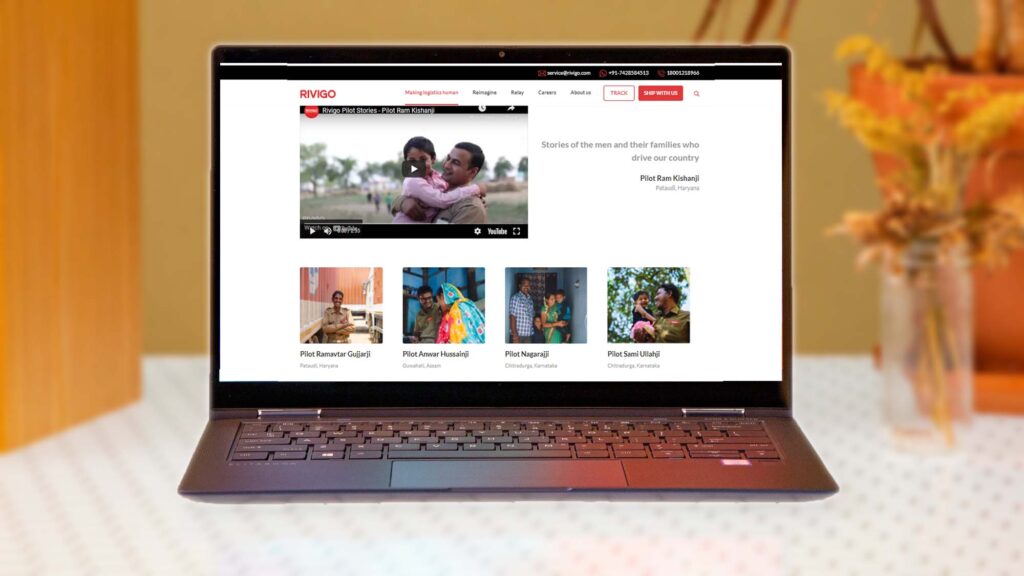The splendour of a truck, expanse of the highways, and the opportunity to discover new places. Bhagwandas’s dream to become a truck driver was sparked by his father, who was in the profession. His father was not very happy with the idea though. In their village – Haryana, truck drivers were called the 37th caste (an outcaste) of the society and were associated with various social vices. As a father, he did not want his son to lead the same distressed life, so he made him do an ITI skills training course instead. However, life had other plans for Bhagwandas, as he ended up trucking driving with Rivigo and today, leads a life of his and his father’s dreams.
With Rivigo, about eight thousand Bhagwandas come home to their families every day. Like any other professionals, they wear uniforms, have specific work hours and work in a safe environment. They get several fringe benefits and their children go to school. Most importantly, nobody in their family sleeps with an empty stomach anymore.
Founding of Rivigo
Even as consultants in Mckinsey & Company, Deepak Garg and Gazal Kalra always knew they had to build something of their own and it had to be a game changer, something that the entire world would be inspired from.
While working at Mckinsey, Deepak was especially interested in the logistics and automotive sector. So, choosing the same sector for his own business was not difficult. But it was during his research on the field that he came to notice how flawed the system was. India, back then, needed one million new truck drivers every year for the next 10 years to support its freight transportation system as well as to achieve the GDP growth aspiration, but the driver-to-truck ratio remained below 750 per 1000 in the country. Deepak realised the issue was not about the truck pilots’ income or the skill gap, but their own poor socio-economic growth that made their families push them to quit their job. The drivers live a poor-quality of life, staying away from home for months under poor and unsafe conditions. While most of them have little to no time for their families, others do not even get to start one. On the top of it, substance abuse and diseases like HIV are a common site in the community.
Deepak only got to witness all these problems first hand during one of his trips to Jaipur. He knew truck driving was too inhumane to be a profession and he was going to do something about it.
‘‘
Rivigo has managed to disrupt the logistics market by introducing the first-ever global idea of relay driving and providing it as a service to other fleet owners.
Relay Model: The Birth of a Billion-Dollar Idea
To Deepak and Gazal, their goal was crystal clear. They needed to bring in a radical innovation that would improve the lives of these truck pilots, while also changing how the logistics sector functioned as a whole. So, they decided to run trucks to deliver goods and just like that, in the year 2014, Rivigo was born.
This endeavor did, however, come with a twist. Its founders knew in order to make an impact, it was necessary to build a proper logistics and supply chain ecosystem and so they built what is known as a driver relay model in the industry today.
The relay model is an operational business model that works like a relay race. The process starts as a truck pilot drives through his shift before changing over with another fellow pilot and passing him the truck like a baton is passed on in a relay race. This way, every pilot drives for about four to five hours over a network of relay pit-stops until the vehicle delivers the goods to its destination. The pilots who are done with their shifts come back via another truck, that halts at the same pit stops on its way back from the opposite direction. So, both the trucks keep running until they deliver the goods, dropping off the pilots, who got off their shifts, to their home bases along the way, thereby making sure all the pilots reach home at the end of the day.
Rivigo’s Beliefs as a Brand
The company believes the personal growth of their pilots helps in eventual growth of the company. If their pilots reach home every day, they no longer lead a lonely life, eat irregular meals in unhygienic places or sleep in unfamiliar and unsafe surroundings. The relay system also brings down their 14-15 hours of drive a day to just four or five hours, preventing them from driving in stressful fatigued conditions, that can lead to accidents and fatalities. Travelling back and forth on the same, hence, familiar route every time is an added advantage. The pilots’ health, comfort and safety eventually ensure efficiency in their day-to-day tasks as well.
Rivigo stresses on improving the lifestyle of their pilots in other ways as well. The pilots get accurate and timely payments in their bank accounts every month which helps them in saving more money and ensures they successfully get a bank loan- neither of which was possible earlier. The pilots also get health insurance for them and their entire families and scholarships for their children.
Furthermore, the brand focuses on complex data-driven problem solving through technology. The platform is fully digitised and takes care of the entire tracking, allocation, interaction, training, help, chats and performance management for the pilots as well as the clients, making the entire process easier and error free.
‘‘
Rivigo trucks are known for delivering in air equivalent time, making them three times faster than any regular delivery truck.
Technology: Power Source of the Pioneer
In India, about 90 per cent of the logistics takes place via roads, but the transit method does not necessarily give satisfactory results. The reason being apart from the driver shortage, the delivery consumes more time than necessary. Rivigo as a brand seeks to achieve a feasible way to resolve both the issues. As a brand, it is striving to normalize truck driving as a regular day job (by making sure pilots return home every day) while simultaneously leveraging the transit time. When it comes to managing time, the model makes it possible for the company to be able to deliver in air equivalent time ensuring 50 per cent-70 per cent less than the total transit time of a regular truck. So, while a conventional truck takes rounds 3 times a month, a Rivigo truck can do so about 8 times during the same period making it 3 times faster than the former one.
Reduction in the transit time is also the result of the firm’s core strength, that is their cutting-edge technology. Rivigo Labs, the technology think-tank which consists of the country’s best data scientists and engineers, is an important asset to the firm. Thanks to them, all the company’s trucks operate through IOT (Internet of Things), big data and AI (Artificial Intelligence) like advanced technology that facilitate the entire transit process- from viewing performance analytics to checking status updates in real time, with high visibility and transparency.
Apart from convening the rides for the pilots with the app, the company’s tech team has also managed to add new comprehensive solutions in the form of digital services. These services help their client companies get goods delivered in short transit time and with maximum reliability (with Rivigo Zoom) and even allows them to reduce line haul cost per shipment for the goods by creating their own time-sensitive and feasible line haul network (with Rivigo Prime).
How Is Rivigo ahead in the Game?
The Indian logistics industry, which drives about 14 percent of the country’s GDP, has grown massively over the last decade – particularly in the digital trucking operations. With a market size of about $215 billion USD (in 2020), the field has a lot of scope for innovation and big players like Blackbuck, DSV, Truck Suvidha have used it to their maximum advantage. As online logistics service providers, they all give tough competition to Rivigo but the firm has managed to stand out as a brand.
To ensure data driven operation, in all these companies, the drivers and trucks are tracked and connected through applications which consume a lot of battery and data during the travelling. The company, however, has implemented MQTT (Message Queuing Telemetry Transport) to minimize data consumption and maximize battery life in their IoT devices. Unlike most of these firms, Rivigo serves both B2B and B2C transactions and for B2C businesses (like the ones in e-commerce industry), it even takes care of all the state regulatory requirements that can be ambiguous including state permit creation and paying the entry tax. In addition, with self-owned 3000 trucks and one the largest pan India service network, the company is able to provide 90 per cent plus on-time performance, making it much more reliable.
Apart from working for its own marketplace (Rivigo Freight), the company has further extended it’s services by now helping other fleet owners with their own services. The brand got its relay model recognised by the United States Patent and Trademark Office in 2019 and now, that it has patent rights over its model, it has launched what it calls as Relay-as-a-Service (RaaS).
The service is based on using their relay model to empower numerous shippers and fleet operators to optimize their fleet and service altogether. The model uses algorithms to assign, process and complete the task. Thus, through RaaS, the brand is working to create a freight ecosystem where all the stakeholders work together to build the sector which, contrary to its current state, will be known for its safety, reliability, transparency, precision and creating value for everyone. The company has partnered with JK Tyre & Industries to introduce TREEL Tyre Pressure Monitoring System (TPMS), an industry-first partnership for the tech-logistics firm to provide a first-time tyre management solution to fleet owners under RaaS. Aside from this, Rivigo’s clients are able to leverage their reduced Turnaround Time (TAT) and reliability to reinvent their business models – serving new markets, reducing inventory and significantly cutting down cost to serve their customers.

Rivigo: What Lies down the Road
Over the years, this company has constantly strived to better their system and technology. Today, it offers services in various sectors like e-commerce, retail, automobile, cold-chain, healthcare, electronics and FMCG around the country but language barrier for the drivers as well as the clients have been an obstacle in widening their reach to the hilt. So, the company has recently been working on developing AI based Conversational CRM Agents (chatbots) to enable hyper-growth and infinite scalability in connecting with customers while reducing manual interventions in the whole process – yet another first in the industry. Currently, it has a CRM AI Agent for only English language, but they hope to extend it to Hindi, Tamil, Telugu and other Indian languages soon. This is sure to open up the path to the brand in the near future to a whole slew of growth opportunities.




